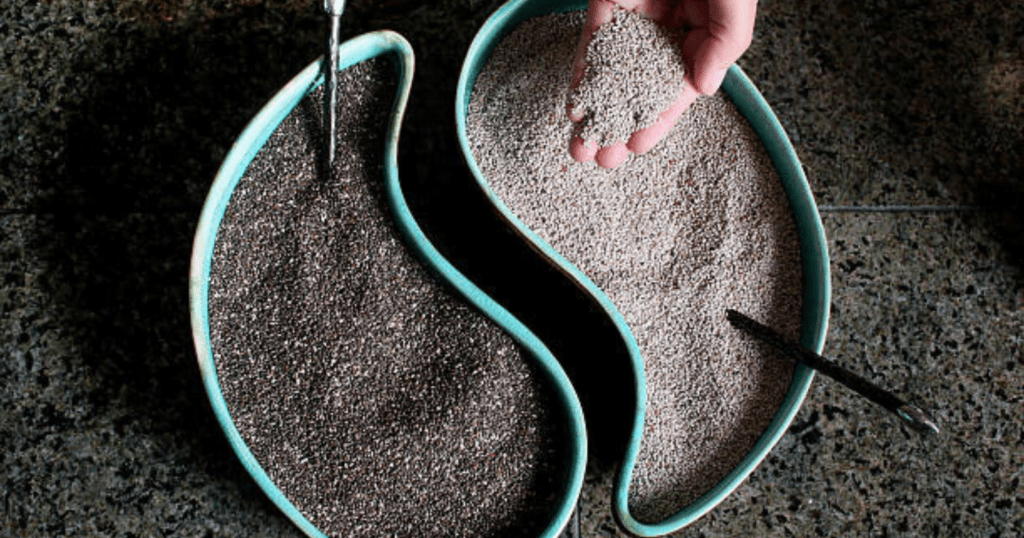Are chia seeds good for you?: Chia seeds, once an obscure ingredient, have gained popularity in recent years as a superfood celebrated for its nutritional value and health benefits. These tiny seeds, derived from the Salvia hispanica plant native to Central America, have been consumed for centuries by indigenous cultures for their purported health-promoting properties. But what exactly makes chia seeds so revered, and are they truly good for you? Let’s delve into the science behind chia seeds and explore their potential health benefits.

Are chia seeds good for you?
Here is the answer Are chia seeds good for you?
Nutritional Powerhouse:
Despite their small size, chia seeds pack a nutritional punch. They are rich in essential nutrients, including fiber, protein, omega-3 fatty acids, antioxidants, vitamins, and minerals. Just a single ounce (about two tablespoons) of chia seeds provides a significant portion of your daily recommended intake for several key nutrients, making them an excellent addition to a balanced diet.
Rich Source of Fiber:
Chia seeds are particularly noteworthy for their high fiber content, with nearly all of the carbohydrates in chia seeds coming from fiber. This soluble fiber absorbs water, forming a gel-like substance in the digestive tract that helps promote feelings of fullness and satiety. Consuming foods high in fiber, such as chia seeds, can support digestive health, regulate bowel movements, and contribute to a lower risk of chronic diseases like heart disease and diabetes.
Omega-3 Fatty Acids:
Chia seeds are one of the richest plant-based sources of alpha-linolenic acid (ALA), a type of omega-3 fatty acid. These essential fatty acids play a crucial role in brain health, heart health, and inflammation regulation. While ALA is not as potent as the omega-3s found in fatty fish, consuming chia seeds can still contribute to overall omega-3 intake, especially for individuals following vegetarian or vegan diets.
Antioxidant Properties:
Chia seeds contain various antioxidants, including flavonoids, phenolic compounds, and vitamin E, which help combat oxidative stress and reduce inflammation in the body. Antioxidants play a vital role in protecting cells from damage caused by free radicals, which are implicated in the development of chronic diseases such as cancer, heart disease, and aging-related conditions.
Blood Sugar Regulation:
Several studies suggest that chia seeds may help regulate blood sugar levels, making them beneficial for individuals with diabetes or those at risk of developing the condition. The soluble fiber in chia seeds slows down the digestion and absorption of carbohydrates, resulting in more stable blood sugar levels after meals. Additionally, chia seeds may improve insulin sensitivity and reduce insulin resistance, further supporting blood sugar control.
Weight Management:
Due to their high fiber and protein content, chia seeds can aid in weight management by promoting feelings of fullness and reducing calorie intake. Including chia seeds in meals or snacks may help curb hunger cravings and prevent overeating, potentially leading to weight loss or maintenance when combined with a balanced diet and regular physical activity.
Easy to Incorporate into Diet:
One of the greatest advantages of chia seeds is their versatility and ease of incorporation into various dishes. Chia seeds have a mild, nutty flavor that pairs well with both sweet and savory recipes. They can be sprinkled on top of yogurt or oatmeal, added to smoothies, used as a thickening agent in puddings and sauces, or even incorporated into baked goods like muffins and bread.
How many children does Beyonce have?
Chia seeds benefits and side effects
Benefits of Chia Seeds:
- High in Nutrients: Chia seeds are a rich source of essential nutrients including fiber, protein, omega-3 fatty acids, antioxidants, vitamins, and minerals, supporting overall health and well-being.
- Digestive Health: The soluble fiber content in chia seeds promotes digestive health by aiding in regular bowel movements, preventing constipation, and supporting a healthy gut microbiome.
- Heart Health: Chia seeds are beneficial for heart health due to their high content of omega-3 fatty acids, which can help lower cholesterol levels, reduce inflammation, and support cardiovascular function.
- Blood Sugar Regulation: Chia seeds may help regulate blood sugar levels by slowing down the absorption of carbohydrates, improving insulin sensitivity, and reducing the risk of spikes and crashes in blood glucose levels.
- Weight Management: Chia seeds can aid in weight management by promoting feelings of fullness, reducing appetite, and supporting healthy metabolism, making them a valuable addition to a balanced diet for weight loss or weight maintenance.
Side Effects of Chia Seeds:
- Digestive Issues: Consuming large quantities of chia seeds, especially without adequate hydration, may lead to digestive discomfort such as bloating, gas, or abdominal cramps due to their high fiber content.
- Potential Allergic Reactions: Some individuals may experience allergic reactions to chia seeds, resulting in symptoms such as itching, hives, swelling, or difficulty breathing. If allergic to other seeds or nuts, caution is advised when consuming chia seeds.
- Risk of Choking: Chia seeds can absorb liquid and swell, forming a gel-like consistency. Ingesting dry chia seeds without sufficient liquid can pose a choking hazard, particularly for young children or individuals with swallowing difficulties.
- Interactions with Medications: Chia seeds may interact with certain medications, particularly blood thinners or anticoagulants, due to their omega-3 fatty acid content. Consult with a healthcare professional before consuming chia seeds if taking medications or having underlying health conditions.
- High Caloric Density: While chia seeds offer numerous health benefits, they are also calorie-dense. Consuming excessive amounts of chia seeds without accounting for their calorie content may lead to weight gain or interfere with weight loss efforts, particularly if not balanced with overall caloric intake and physical activity levels.
In conclusion, chia seeds are indeed a nutritional powerhouse packed with essential nutrients and health-promoting compounds. From their high fiber and omega-3 fatty acid content to their antioxidant properties and blood sugar-regulating effects, chia seeds offer a myriad of potential health benefits. Incorporating chia seeds into your diet can be a simple and delicious way to enhance your overall health and well-being. However, as with any food or dietary supplement, moderation is key. Including chia seeds as part of a balanced diet alongside other nutritious foods is the best approach to reap their full benefits and support optimal health.
